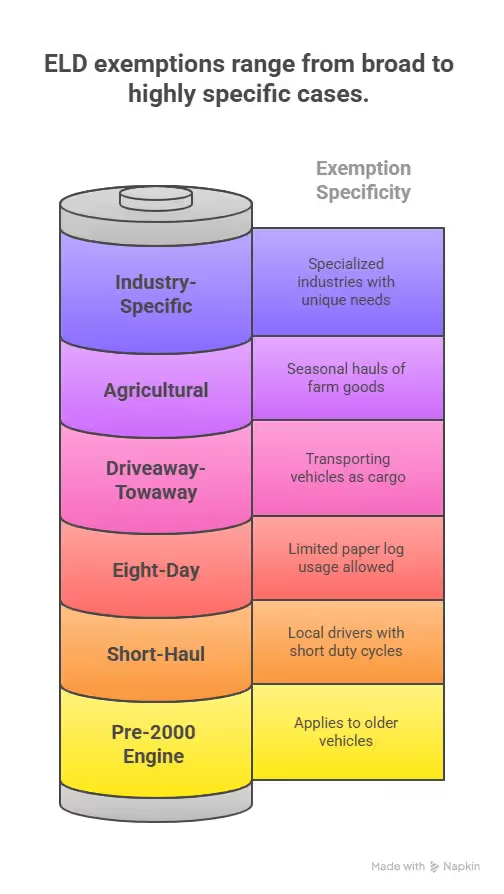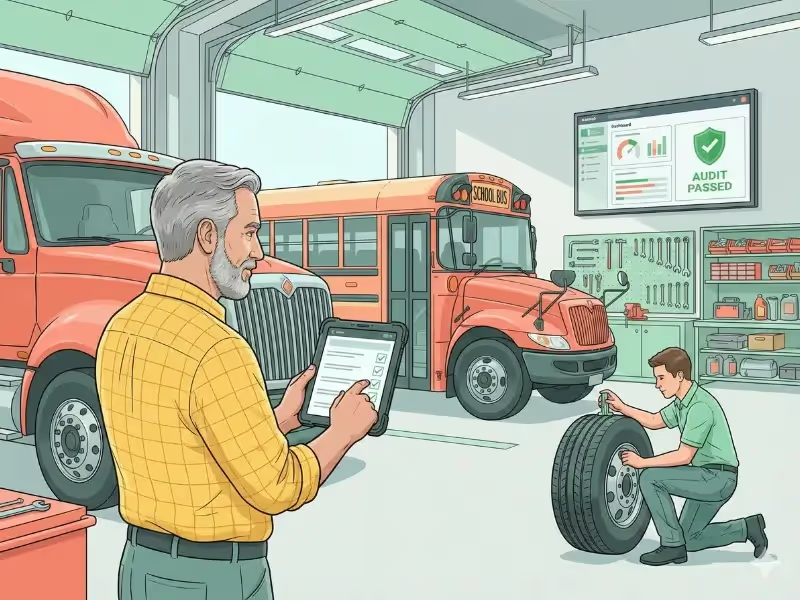Key Takeaways
ELDs (Electronic Logging Devices) are required for most commercial drivers to track Hours of Service (HOS), but some drivers and vehicles are exempt.
Common ELD exemptions include: Pre-2000 engines, Short-haul/local drivers (150 air-mile radius), Driveaway-towaway operations, Paper logs used 8 days or less in 30 days, Agricultural and seasonal hauls
Even if exempt, drivers must still follow HOS rules and keep proper records.
Risks of using paper logs include mistakes, lost data, and longer inspections.
Benefits of using ELDs anyway: fewer errors, real-time alerts, better planning, faster inspections, and future rule readiness.
Fleet managers should keep clear records, train drivers, and track exemption use carefully.
Using tools like Simply Fleet makes ELD compliance and exemption tracking easier and smarter.
The Electronic Logging Device (ELD) mandate has transformed the way commercial trucking fleets manage hours-of-service (HOS) compliance. Designed to improve safety and reduce driver fatigue, the mandate requires most drivers in interstate commerce to use electronic devices to track their driving time automatically.
However, not all drivers and vehicles fall under the strict ELD requirements. There are specific exemptions built into the Federal Motor Carrier Safety Administration (FMCSA) rules that allow certain carriers and operators to follow alternative record-keeping methods.
For fleet managers, understanding these exemptions is critical. It helps you ensure compliance, avoid costly violations, and make smarter decisions about whether or not to adopt ELD technology for your fleet. In this article, we will break down the most important ELD exemptions, explain who qualifies, and explore why even exempt fleets can benefit from using ELDs.
What is the ELD Mandate?
Before diving into exemptions, it’s important to understand what the ELD mandate requires. Since December 2017, most commercial truck drivers engaged in interstate commerce have been required to use electronic logging devices certified by the FMCSA to record their hours-of-service.
ELDs connect directly to the vehicle’s engine control module (ECM) and automatically track critical data, including:
- Engine hours
- Vehicle movement and miles traveled
- Location coordinates
- Date and time stamps
This automated system replaces traditional paper logs, reducing the risk of errors, falsification, and improving roadside compliance inspections. Drivers who fail to comply with the ELD mandate can be placed out of service and face fines or other penalties, including impacts on the fleet’s CSA (Compliance, Safety, Accountability) scores.
Who Is Exempt from Using ELDs?

While the ELD rule covers most commercial drivers, the FMCSA has created specific exemptions to address operational realities and vehicle capabilities. These exemptions fall into two broad categories:
- Vehicle-based exemptions (related to the truck or engine)
- Driver-based exemptions (related to driver duties or operational patterns)
Here are the main exemptions fleet managers should be aware of:
1. Pre-2000 Engine Exemption
The most common exemption applies to vehicles with engines manufactured before the model year 2000. Because most older engines do not have the electronic control modules (ECMs) necessary for ELD integration, these trucks are exempt from the mandate.
Key points:
- The exemption is based on the engine’s model year, not the vehicle’s manufacture year.
- If an engine swap replaces a newer engine with a pre-2000 model, the exemption carries with the engine.
- Fleets should keep documentation of engine manufacture dates on file and with the vehicle to prove exemption status during inspections.
2. Short-Haul (Local Driver) Exemption
Drivers who operate within a limited radius and have short duty cycles may qualify for a partial exemption. Specifically:
- The driver’s duty must start and end at the same location.
- Operations must be within a 150-air-mile radius (approximately 172 land miles).
- The driver must return to the home terminal and complete duty within 14 consecutive hours.
Under this exemption, drivers are allowed to use paper logs instead of an ELD. However, they must still comply with all applicable HOS limits.
3. “Eight-Day” Paper Log Exemption
Drivers who use paper logs for no more than 8 days within any 30-day period are exempt from the ELD requirement during those days.
- If a driver exceeds 8 days on paper logs, they must switch to ELDs for the remainder of the 30-day period.
- Drivers must keep accurate paper logs during those 8 days and use ELDs when not exempt.
Download our free Fleet Automation Readiness Checklist
4. Driveaway-Towaway Operations Exemption
This applies to drivers who are transporting vehicles as cargo themselves. For example:
- Driving newly sold trucks, motorhomes, or other vehicles being delivered to a customer.
- Since the driven vehicle is the commodity, these drivers are exempt from ELDs but must still comply with HOS limits and maintain proper records.
5. Agricultural Operations Exemption
Certain agricultural hauls during planting and harvesting seasons are exempt, provided they occur within defined distances and timeframes.
- These exemptions are often state-specific, so fleets should verify local agricultural exemption rules.
- Generally, this exemption applies to vehicles transporting farm supplies, equipment, or commodities during specified periods.
6. Industry-Specific Exemptions
Some specialized industries, such as construction, logging, or glass-hauling, may qualify for limited exemptions or waivers based on unique operational requirements. These are granted through a formal waiver application process with FMCSA.
Other Important Considerations
Glider Kits
Many fleets use glider kits, which are essentially new cabs and chassis paired with older engines. FMCSA exempts vehicles based on the engine model year, so if a glider kit uses a pre-2000 engine, the vehicle remains exempt.
Best practice: Keep thorough records of engine swaps and documentation with the vehicle and fleet office for inspection purposes.
Small Carriers
Despite lobbying efforts, there is currently no ELD exemption based solely on fleet size. Whether you operate one truck or hundreds, your fleet must comply with the ELD mandate unless another exemption applies.
The Risks of Relying on Paper Logs
Even if your fleet qualifies for an exemption, there are important risks to consider when continuing to use paper logs:
- Data loss: Paper logs are easily misplaced, damaged, or illegible.
- Administrative burden: Reconciling paper logs with schedules, receipts, and invoices is time-consuming.
- Inspection delays: Paper logs can lead to longer roadside inspections and increased chances of citations.
- Errors and inaccuracies: Manual entry increases the chance of errors or falsification accusations.
Why Even Exempt Fleets Should Consider ELDs
ELDs aren’t just a compliance tool; they offer operational benefits that can improve your fleet’s efficiency and safety, even if you qualify for an exemption:
- Automated and accurate HOS tracking saves time and eliminates human error.
- Real-time alerts warn drivers before they approach HOS limits, helping avoid violations.
- Improved CSA scores by reducing form-and-manner errors and enabling proactive driver coaching.
- Fleet visibility: Fleet managers gain insight into driver activity, improving dispatch and route planning.
- Faster roadside inspections with digital logs that are easy to produce and verify.
- Future-proofing: FMCSA regulations continue to evolve; using ELDs keeps you ready for changes.
Many modern fleet management solutions also include features like vehicle diagnostics, fuel management, and maintenance scheduling, further extending the value of adopting ELDs.
Managing Exemptions Effectively: Best Practices
To maintain compliance and reduce operational risk, fleet managers should:
- Maintain thorough records of engine model years, exemption certificates, and waiver documents.
- Ensure drivers are trained on when and how to use paper logs properly and understand their exemption status.
- Monitor paper-log usage closely, once a driver uses more than 8 paper-log days in 30, switch them to ELDs immediately.
- Keep documentation accessible for roadside inspections, including engine swaps or glider kit details.
- Consider hybrid telematics solutions that provide some benefits of ELDs for exempt vehicles (such as mileage tracking and basic compliance alerts).
- Stay updated on FMCSA rule changes that might affect exemptions or compliance requirements.
Manage ELD Exemptions Effortlessly with Our Solutions
ELD exemptions help address practical challenges faced by certain drivers and vehicles, but they come with responsibilities. Fleet managers must understand when and how these exemptions apply and ensure that all record-keeping obligations are met.
Even if your fleet qualifies for an exemption, adopting ELD technology offers clear benefits that improve compliance, safety, and operational efficiency. Ready to simplify ELD compliance and manage your fleet with ease? Simply Fleet offers advanced fleet management solutions designed to help you deal with ELD exemptions while boosting efficiency and safety.
Contact Simply Fleet today and take control of your fleet’s compliance and performance!



.png)








.png)


.png)
%20(1).avif)







.avif)


